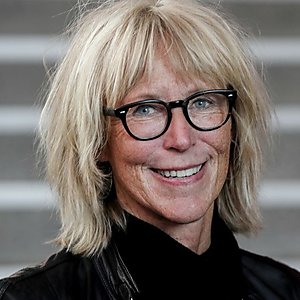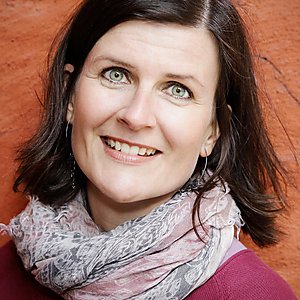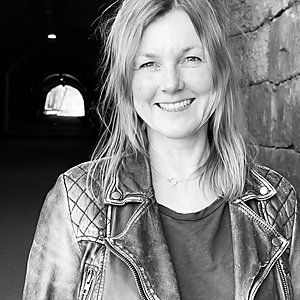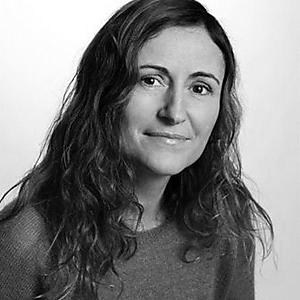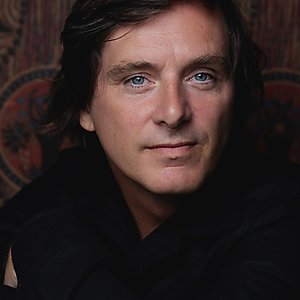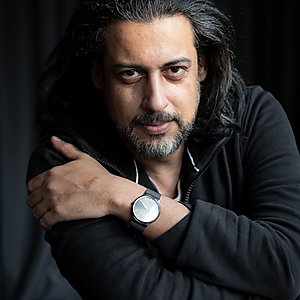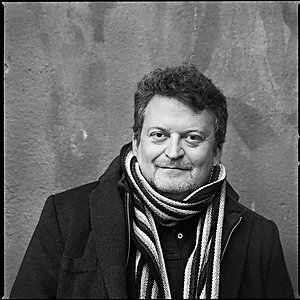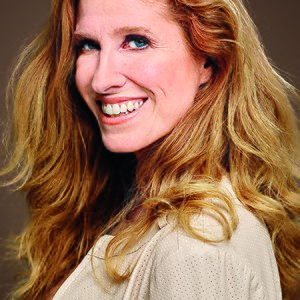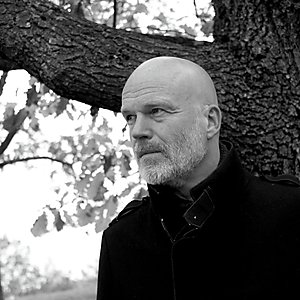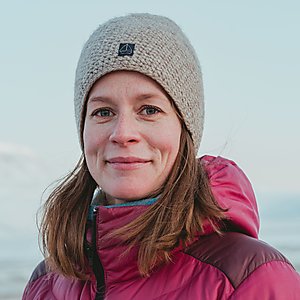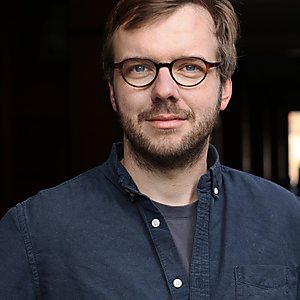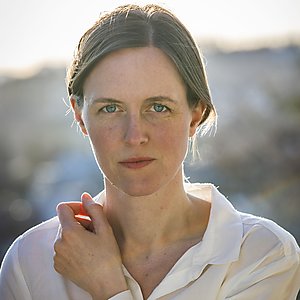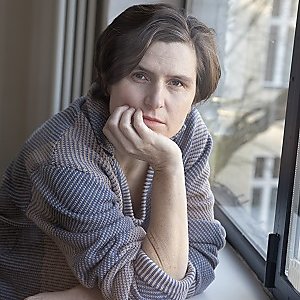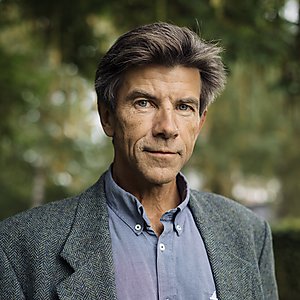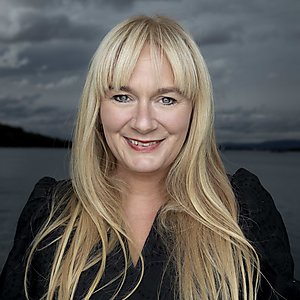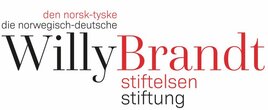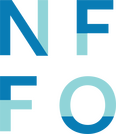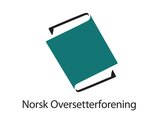PROGRAMME
Tuesday, 7 December, Universitetsaula, Oslo
6.20-7.00 pm
German-Iraqi author Abbas Khider meets Simon Stranger for a conversation about belonging, emigration and language.
The conversation will be moderated by former NRK cultural journalist Agnes Moxnes.
Abbas Khider has published six critically acclaimed novels to date, all of which take inspiration from his childhood in war-torn Iraq. As a young man, he managed to flee the country where he saw no future for himself and came to Germany, where he still lives today as an Iraqi exile. His novel Ohrfeige (A Slap in the Face / Et slag i ansiktet) was published by Mangschou forlag in 2020. The title Palast der Miserablen (Palace of the Miserables / De elendiges palass) is scheduled for publication in early 2022.
War, emigration, and exile are also themes addressed by Norwegian author Simon Stranger in his outstanding literary repertoire, which consists of fiction and non-fiction for children and adults. In the autumn, Stranger published the novel 304 dager (304 Days / 304 Tage), which was highly praised by critics.
In a conversation between the German and Norwegian authors, we take a closer look at this form of factual fiction, what it means to write in a language other than one's mother tongue, and what motivations and methods there are for conveying strong stories like those in Khider’s and Stranger's books.
Please note:
This talk is part of the 50th anniversary of the Nobel Peace Prize awarded to Willy Brandt and will be held in the university auditorium (Universitätsaula) in Oslo. Please register at info@willy-brandt-stiftelsen.no. The number of places is limited. More information on the Nobel Prize anniversary:
http://willy-brandt-stiftelsen.no/aktuelt
Wednesday, 8 December, Litteraturhuset, Oslo
4.30-4.50 pm
Erik Fosnes Hansen's opening speech for the Reading Tour
Erik Fosnes Hansen's books have been translated into 36 languages, and it is a major event in Germany every time a German translation is published. In 2019, Fosnes Hansen was Artistic Director of the German-Norwegian Literature Festival at Oslo's Litteraturhuset, which was held in advance of Frankfurter Buchmesse when Norway was the Guest of Honour there. Fosnes Hansen will talk about the relationship between Norwegian and German authors, between German-language and Norwegian literature, and what will be discussed at the literary events. He will also look back at Norwegian literature in 2019 as well as provide an overview of the present day.
Free admission.
5.00-5.45 pm
German writer Matthias Jügler meets fellow writer (and his translator) Helene Imislund for a conversation about the long-term effects of the GDR regime.
The critically acclaimed novel Die Verlassenen (The Forsaken) by Matthias Jügler is about the "unjust state" of the German Democratic Republic (GDR, former Soviet-controlled East Germany) and how it can continue to impact our own time: a mother dies too soon; a father simply disappears. The protagonist Johannes finds no answers to many questions – until a letter from Norway changes everything. Following his parents’ trail, he travels to Grimstad, where piece by piece he uncovers the family history, still buried in the past of the GDR long after the fall of the Berlin Wall.
While Matthias Jügler explores the influence of a totalitarian regime on individuals, the novellas in Helene Imislund's recent book Alle tings kjerne (The Core of All Things) explore regimes in the form of a family or a romantic relationship. Both Jüglers and Imislund's main characters are at a turning point. Something fundamental in life is about to change, because a regime is losing its control.
The two writers, who know each other well, talk about the legacy of the GDR in 2021, as well as a Germany that remains divided, unprocessed traumas, angry letters to the editor, and what happens when a former Stasi spy suddenly rings.
Language: German and Norwegian. The talk will be translated live. Free admission.
6.00-6.45 pm
Austrian author Ursula Poznanski and Norwegian author Arne Svingen in conversation with Merete Franz.
Ursula Poznanski and Arne Svingen both write children's and young adult literature in their respective home countries. Their conversation revolves around their two critically acclaimed books about growing up in a world where significant loss is imminent.
In 2020, Poznanski released the award-winning young adult thriller Cryptos, set in a world already brought to its knees by climate change. Where do we go when there are no places left? In Svingen's Brageprisen-nominated En himmel full av skyer (A Sky Full of Clouds / Ein Himmel voller Wolken), we meet an eleven-year-old who is terminally ill with cancer. Doomed to die like the earth itself, he decides to become an environmentalist.
During the German-Norwegian Reading Tour, the two will meet to talk about what it is like to grow up in Austria and Norway today with the climate crisis as an ominous backdrop, along with new technology and social challenges. To what extent is growing up in Austria different from growing up in Norway? Why do the authors want to write for young readers? Are there differences in the reading habits of young people who speak German versus those who speak Norwegian? Merete Franz leads the discussion.
Language: German and Norwegian. The discussion will be translated live. Free admission.
7.00-7.45 pm
German writer Judith Schalansky meets Norwegian writer and biologist Dag O. Hessen for a conversation about biology, extinct species, and diminishing nature. The conversation is chaired by Elisabeth Beanca Halvorsen.
Whether fiction or non-fiction, biology is the dominating topic in Judith Schalansky's books. Her novel Der Hals der Giraffe (The Giraffe’s Neck / Sjiraffens hals) is written from the perspective of a biology teacher, while Verzeichnis einiger Verluste (An Inventory of Losses / Fortegnelse over det tapte) contains twelve wondrous chapters about objects, places and animals – including the Caspian tiger – which have been lost to the world.
Unlike Schalansky, Dag O. Hessen is a trained biologist and has written a number of non-fiction books on biology and the climate. His history of carbon, C - Karbon - en uautorisert biografi (Cappelen Damm 2017), was translated into German by Günter Frauenlob in 2019 with the title C - Die vielen Leben des Kohlenstoffs (C - The Many Lives of Carbon). Many of the same issues are picked up again in Verden på vippepunktet (The World on the Brink / Die Welt auf der Kippe). The two authors meet for a conversation about the world of biology and give us insights into why they write about its decline.
Language: German and Norwegian. The conversation will be translated live. Admission free.
Thursday, 9 December, Bergen Kunsthall
5.30-6.15 pm
Ursula Poznanski and Line Nagell Ylvisåker in conversation with Margunn Vikingstad
Ursula Poznanski (Austria) has written several bestselling novels for young adults about a world before, during, and after a climate catastrophe. This relatively new genre for which she writes is called "climate fiction" or cli-fi. The term emerged in the period when Margaret Atwood's first volume of her MaddAddam trilogy (Oryx and Crake) was published in 2003, in which an environmental disaster has destroyed most of humanity following an experiment.
Line Nagell Ylvisåker, who lives in the Svalbard archipelago in the Arctic Ocean, has written a book about the climate changes she sees all around her every day: Adventfjorden no longer freezes over, the permafrost is thawing, the sea is getting warmer and more acidic, and formerly dry snow days are now wet with rain. Following the 2015 landslide in Longyearbyen, she wrote the book Verda mi smeltar. It was well received in Norway and translated into other langauges, appearing in German as Meine Welt schmilzt (My World is Melting).
Can literature help us participate in the social developments that come with climate challenges? And how does a dystopian vision of the future influence us as compared to more hopeful narratives? And what is it like for children and young people to grow up in the shadow of the climate crisis in Europe today – specifically in Austria and Svalbard?
Language: German and Norwegian. The conversation will be translated live. Free admission.
6.30-7.15 pm
German writer Matthias Jügler meets fellow writer (and his translator) Helene Imislund for a conversation about the long-term effects of the GDR regime.
The critically acclaimed novel Die Verlassenen (The Forsaken) by Matthias Jügler is about the "unjust state" of the German Democratic Republic (GDR, former Soviet-controlled East Germany) and how it can continue to impact our own time: a mother dies too soon; a father simply disappears. The protagonist Johannes finds no answers to many questions – until a letter from Norway changes everything. Following his parents’ trail, he travels to Grimstad, where piece by piece he uncovers the family history, still buried in the past of the GDR long after the fall of the Berlin Wall.
While Matthias Jügler explores the imfluence of a totalitarian regime on individuals, the novellas in Helene Imislund's recent book Alle tings kjerne (The Core of All Things) explore regimes in the form of a family or a romantic relationship. Both Jüglers and Imislund's main characters are at a turning point. Something fundamental in life is about to change, because a regime is losing its control.
The two writers, who know each other well, talk about the legacy of the GDR in 2021, as well as a Germany that remains divided, unprocessed traumas, angry letters to the editor, and what happens when a former Stasi spy suddenly rings.
Language: German and Norwegian. The talk will be translated live. Free admission.
7.30-8.15 pm
German writer Judith Schalansky meets Norwegian journalist and essayist Marit Eikemo for a conversation about the appeal of ruins – with examples from recent German and Norwegian history.
This conversation looks into the similarities between Judith Schalansky’s Verzeichnis einiger Verluste (An Inventory of Losses / Fortegnelse over det tapte, 2021) and Marit Eikemo’s Samtidsruinar, 2008 (Contemporary Ruins / Gegenwartsruinen). With different means and methods, they explore a broad range of ruins and losses: from Greta Garbo's beauty and Berlin's Palast der Republik (the cultural flagship of former East Germany) to an oil platform in the North Sea. For the German-Norwegian Reading Tour, Eikemo's essay Alt søkk i havet (All sink in the sea / Alle versinken im Meer) about the Ekofisk oil field was translated into German by Nora Pröfrock. The two authors will read to each other and share insights into the contemporary ruins of their respective homelands, some of which have become symbols of lost lives. Perhaps they will also reveal the next ruin to be the focus of their literary reflections.
Elisabeth Beanca Halvorsen, Judith Schalansky's Norwegian translator, will lead the discussion.
Language: German and Norwegian. The conversation will be translated live. Free admission.
